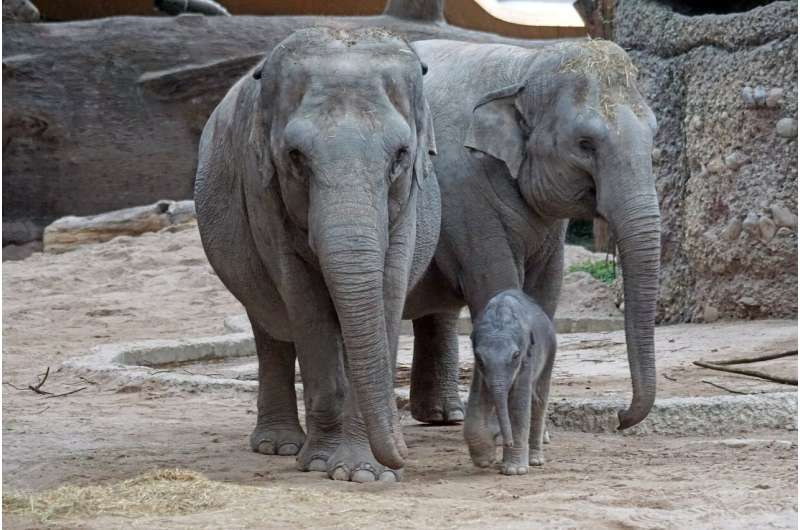Sisters improve chances of reproduction in Asian elephants

Researchers at the University of Turku found that the presence of a maternal sister was positively and significantly associated with annual female reproduction in a population of working elephants in Myanmar. In addition, an age-specific effect was found: young females were more sensitive to the presence of sisters and even more likely to reproduce when living near a sister.
"We studied Asian elephants working in the teak industry in Myanmar. The elephants are released to the forest for the evenings and nights and other holiday periods, when they can move around freely, eat and meet other elephants. Our study compared the annual reproductive rate of females living with and without maternal sisters. We found that young females, in particular, are more likely to reproduce in a given year when living near a maternal sister, and this effect was strongest when the sister was 0–5 years younger," says Emily Lynch, lead author of the study.
The authors claim that while the proximate mechanism driving enhanced reproduction may be related to improved health generated by sociality, such age-related benefits suggest other factors may be at play.
"Especially because the parenting experience may be crucial for successfully rearing offspring, young, inexperienced females are at a disadvantage and assistance from relatives may therefore be particularly valuable to young females."
Relationships among females have an important evolutionary basis—"Although there is widespread evidence that individuals prefer relatives over non-relatives as social partners, little is known about the potential benefits associated with living with kin in long-lived, social mammals," Lynch says.
Because elephants are highly social and matrilocal animals, meaning that females remain in their natal group with female relatives throughout their lifetime, it is likely that social relationships provide varying benefits across a female's lifetime.
"Sociality is known to improve both physical and mental health in humans, for example. This study shows that in elephants socialising with female relatives improves the changes of female reproduction. However, the motivation to nurture relationships with female relatives is age-dependent, which, in turn, results in a variety of fitness benefits. Overall, the study suggests that relationships among female kin are of evolutionary importance in long-lived social mammals," Lynch says.
These results build on previous work on this population, in which it was discovered that the presence of a maternal grandmother is associated with improved grand calf survival and increased reproductive output of the daughter, and this effect was particularly strong among young daughters.
"This study is particularly exciting because we were able to access information on elephant reproduction across several generations to effectively examine the evolutionary consequences of female social relationships with kin. Access to such longitudinal data on a long-lived, social mammal is rare and we are now able to have a better grasp of the importance of living with relatives in elephants," Lynch says.
More information: Emily C. Lynch et al. Evolutionary significance of maternal kinship in a long-lived mammal, Philosophical Transactions of the Royal Society B: Biological Sciences (2019). DOI: 10.1098/rstb.2018.0067
Provided by University of Turku



















